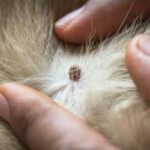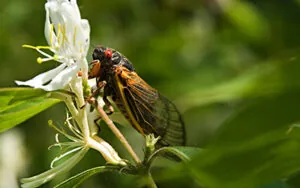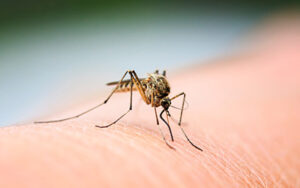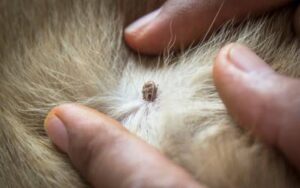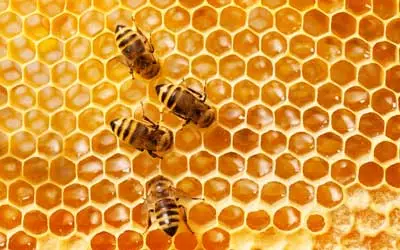
Most people in our area have dealt with a bee or wasp sting at some point in their lives. We all know that their stings are painful, but did you know that they can cause serious allergic reactions, potentially resulting in hospitalization?
It is important to be able to identify stinging insects on your property in Knoxville so that you understand the risks associated with being stung by them. Read on for expert advice about bees, wasps, and their stings from the experienced technicians at Russell’s Pest Control.
Wasp Stings Versus Bee Stings
Sometimes, bee and wasp stings can feel almost identical in their strength and symptoms. Although they are quite comparable in results, they work very differently. There are three main differences:
- Stinger: Bees’ stingers completely eject from their bodies when they target a victim, pulling out parts of their innards and causing them to die shortly after. Wasps’ stingers stay intact and can be used many times in a row on a single victim.
- Volume: Bees only sting once, but use all of their venom on this sting, usually totaling around 50 micrograms. Wasps limit their stings to 2-15 micrograms of venom, but it is more powerful and can be used multiple times in quick succession.
- Venom: Wasps and bees’ stings also differ due to the venom that they contain. However, despite the different chemical makeups of their venom, they both cause the release of histamine in our bodies, which creates hive-like bumps across our skin.
 Do Bee or Wasp Stings Cause Allergic Reactions?
Do Bee or Wasp Stings Cause Allergic Reactions?
You can develop an allergic reaction after either a bee sting or a wasp sting. It is possible to be allergic to both kinds, just one or the other, or neither at all. Usually, a sting from a wasp or bee will only result in mild symptoms, as in:
- Swelling
- Itchiness and redness
- Pain and soreness
However, serious allergic reactions can catch you off guard if you aren’t prepared. There are thousands of hospitalizations resulting from bee and wasp stings every year. The most dangerous result of a bee sting is the development of anaphylaxis, a particular kind of allergic reaction. The worst symptoms of anaphylaxis are:
- Swelling of the tongue and throat
- Difficulty breathing
- Pain and itchiness across the body
- Vomiting
- Fainting
Avoiding Bee and Wasp Stings
While you can respect that stinging insects like bees and wasps play an important role in the ecosystem, that doesn’t mean you shouldn’t work to avoid the threat of their attacks. Different bees and wasps have different things they’re attracted to, and a lot of what is done to deter them will also prevent a variety of other pests. Precautions to help keep bees and wasps out of your property may include:
- Treating exterior wood with a proper repellent to keep nests from being built
- Eliminating sources of stagnant water, which will keep them from multiplying
- Covering food sources, especially pet food and any sweet-smelling trash
- Hire a professional exterminator: If you find a nest on your property, call a professional to have it removed safely.
If you do all of that and still wind up with a nest full of sharp-ended invaders, that’s okay. All it means is that it’s time to hire a professional wasp and bee exterminator. And if you’re a household in the Knoxville area, the best bee and wasp nest removal is done through Russell’s Pest Control.
Treating Bee and Wasp Stings
Sometimes things don’t go your way, and you or someone else ends up with a nasty wasp or bee sting. So how do you treat a stinging insect wound? The answer depends on the attacker in question.
If you need to treat a bee sting, it’s important to remove the entire stinger as soon as possible. This can be done as easily as with a pair of tweezers. Afterward, you should wash the area with soap and water before covering it with a warm compress. From that point on you may experience itching and mild swelling, both of which can be relieved by mild painkillers and hydrocortisone cream.
But what do you do if you get stung by a wasp? Wasps don’t leave behind a stinger, which is why they’re able to sting as much as they’re able. Aside from that, you can treat a wasp sting in the same way you do a bee, by washing the area with soap and water and applying an ice pack to sooth pain and swelling.
With bees and wasps, stings should normally result in mild pain and irritation for a short duration of time. If you or someone you know experiences symptoms that are particularly severe, you shouldn’t hesitate to seek immediate medical attention.
Wasp and Bee Control for Knoxville Homes
Bee and wasp stings are not to be brushed off as inconsequential. Even if you’ve never had an allergic reaction to a sting before, there is an underlying chance of an adverse reaction. If you need help telling apart bees and wasps in Knoxville, talk to your local pest control company. The experts at Russell’s Pest Control will be able to assess your situation to determine the species of insect, the location of their nest, and the safest and most efficient removal strategies.
How are Bee and Wasp Stings Different? in Knoxville TN
Serving East Tennessee since 1971
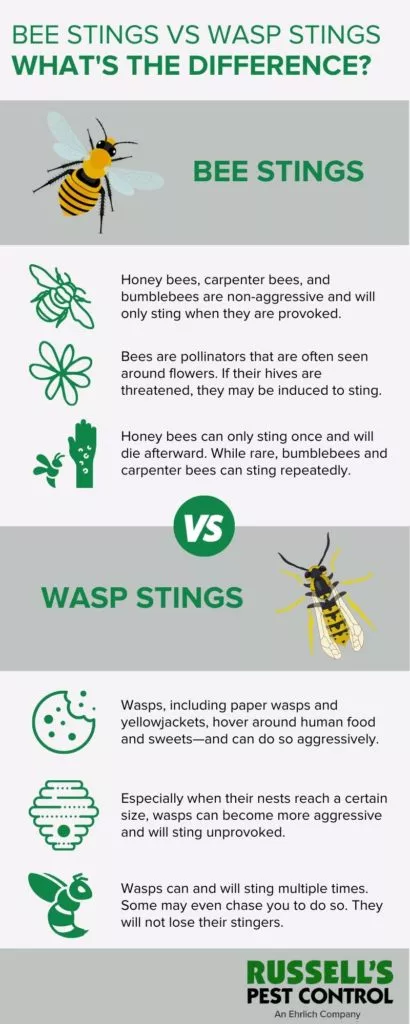 Do Bee or Wasp Stings Cause Allergic Reactions?
Do Bee or Wasp Stings Cause Allergic Reactions?
